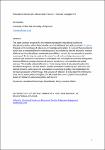Educational Studies and Educational Practice: A Necessary Engagement
| dc.contributor.author | Hordern, Jim | |
| dc.date.accessioned | 2023-05-22T13:47:47Z | |
| dc.date.available | 2023-05-22T13:47:47Z | |
| dc.date.issued | 2023-05-19 | |
| dc.identifier.issn | 0007-1005 | |
| dc.identifier.issn | 1467-8527 | |
| dc.identifier.uri | https://pearl.plymouth.ac.uk/handle/10026.1/20909 | |
| dc.description.abstract |
This paper assesses prospects for the relationship between educational studies and educational practice, with reference to the current institutional and policy context in England. Drawing on the sociology of educational knowledge and practice, it is argued that educational studies can be conceptualised in contrasting ways, by considering internal structures, external relations and how disciplinary problematics are defined, but also by how educational practice is portrayed. To develop the analysis, Bernstein’s work on knowledge structures and academic and professional discourses is articulated with philosophical work that distinguishes between different conceptualisations of practice prevalent in the humanities and social sciences. This enables critical reflection on three arrangements of educational studies (the foundation disciplines, the new science, and the deliberative traditions) each with their own internal dynamic, socio-epistemic assumptions, relationship to policy, and implications for the future production of knowledge. This process of reflection is illustrated with reference to some recent developments in England that illuminate the current position of educational studies in relation to educational policy and practice. | |
| dc.format.extent | 1-17 | |
| dc.language | en | |
| dc.publisher | Informa UK Limited | |
| dc.subject | educational knowledge | |
| dc.subject | disciplinarity | |
| dc.subject | theory-practice relation | |
| dc.title | Educational Studies and Educational Practice: A Necessary Engagement | |
| dc.type | journal-article | |
| dc.type | Journal Article | |
| plymouth.author-url | https://www.webofscience.com/api/gateway?GWVersion=2&SrcApp=PARTNER_APP&SrcAuth=LinksAMR&KeyUT=WOS:000990929900001&DestLinkType=FullRecord&DestApp=ALL_WOS&UsrCustomerID=11bb513d99f797142bcfeffcc58ea008 | |
| plymouth.issue | ahead-of-print | |
| plymouth.volume | ahead-of-print | |
| plymouth.publication-status | Published online | |
| plymouth.journal | British Journal of Educational Studies | |
| dc.identifier.doi | 10.1080/00071005.2023.2213310 | |
| plymouth.organisational-group | |Plymouth | |
| plymouth.organisational-group | |Plymouth|Faculty of Arts, Humanities and Business | |
| plymouth.organisational-group | |Plymouth|Faculty of Arts, Humanities and Business|Plymouth Institute of Education | |
| plymouth.organisational-group | |Plymouth|REF 2021 Researchers by UoA | |
| plymouth.organisational-group | |Plymouth|Users by role | |
| plymouth.organisational-group | |Plymouth|Users by role|Academics | |
| plymouth.organisational-group | |Plymouth|REF 2021 Researchers by UoA|UoA23 Education | |
| dcterms.dateAccepted | 2023-05-09 | |
| dc.date.updated | 2023-05-22T13:47:47Z | |
| dc.rights.embargodate | 2023-5-24 | |
| dc.identifier.eissn | 1467-8527 | |
| dc.rights.embargoperiod | forever | |
| rioxxterms.versionofrecord | 10.1080/00071005.2023.2213310 |


